- Home
- Michael Dobbs
The Reluctant Hero
The Reluctant Hero Read online
The Reluctant
Hero
Also by Michael Dobbs
The Edge of Madness
The Reluctant
Hero
MICHAEL DOBBS
First published in Great Britain by Simon & Schuster UK Ltd, 2010
A CBS COMPANY
Copyright © Michael Dobbs, 2010
This book is copyright under the Berne Convention.
No reproduction without permission.
® and © 1997 Simon & Schuster Inc. All rights reserved.
The right of Michael Dobbs to be identified as author of this
work has been asserted by him in accordance with sections
77 and 78 of the Copyright, Designs and Patents Act, 1988.
Simon & Schuster UK Ltd
1st Floor
222 Gray’s Inn Road
London
WC1X 8HB
www.simonandschuster.co.uk
A CIP catalogue record for this book is
available from the British Library
ISBN HB 978-1-84737-286-4
ISBN TPB 978-1-84737-287-1
eBook ISBN: 978-0-85720-022-8
This book is a work of fiction. Names, characters, places
and incidents are either a product of the author’s imagination or are used
fictitiously. Any resemblance to actual people living or dead, events or
locales, is entirely coincidental.
Typeset in Palatino by M Rules
Printed in the UK by CPI Mackays, Chatham ME5 8TD
To Alice.
A beautiful god-daughter.
PART ONE
The Friend
PROLOGUE
Guilt. A relentless hunter. And no matter how hard Harry Jones ran, he couldn’t escape. He’d turn a corner and there it would be, peering out from the shadows, or sometimes he’d catch a fleeting glimpse of a woman in a crowded street from the corner of his eye, and the whole thing would rush back at him.
Julia. His wife.
And his fault.
It had been a lifetime ago, yet it still felt as though it was yesterday when Zac Kravitz had breezed through town – except that wasn’t entirely true, for Zac never breezed. He was Delta, US Special Forces, a man who moved around with about as much subtlety as a November gale full of snow heading off Lake Huron, where he was born.
Oh, but the man had his uses, and no one could doubt his commitment. They’d first met in the early nineties when Harry had been acting as an adviser to a Colombian government anti-drugs detachment, and Zac had tagged along as an observer. The mission had taken them into the mountains for a little search-and-destroy against the cartels. Sounded like fun, but someone had forgotten to remind the Colombian troops that sometimes it rains in the tropics. The weather had closed in, fouled up their extraction, and that had put all their lives on the line. For three days they’d been forced to play a game of blind man’s buff with heavily armed drug-runners and a jungle full of fire ants. One of Zac’s gadgets had saved the day – typical of Delta types, they loved their toys, and he’d brought along a prototype sat-nav system that had dragged them out of the rainforest mire. While in Harry’s view the former college football player was the sort of guy who had spent his younger days throwing one too many tackles with his head, after Colombia he was welcome, any time.
Loyalty to his own. It’s what kept a soldier motivated. So when Zac sent a message to tell Harry he was passing through England with his wife in tow and had a couple of days to spare, Harry suggested they all spend one of those days down on his boat in Dartmouth. Zac, his wife P.J., Harry. And Julia.
It was a twelve-metre yacht named Guinevere constructed almost entirely of wood, an old racing yacht with teak decks, its original petrol-fired engine, awesome maintenance bills and a pedigree stretching back nearly fifty years. Too much of a handful for most, but that had never bothered Harry. Zac was already pulling the tab off a beer as Julia cast off and Guinevere slipped out into the estuary, her sweet lines catching the eye as she headed into a gentle sou’westerly, the bow barely breaking the swell. There was no way Harry could know he’d already been ‘pinged’ by an Irish Republican active service unit. Provisionals, out for revenge.
Northern Ireland. It had been a peculiarly dirty war and in his SAS days Harry had got his hands grubby, clambering down into the gutter to play the game by the Provos’ own rules at those times when Queen’s Regulations ran out of ideas. Now it was payback time. Harry’s past was catching up with him.
They sailed to Salcombe for their lunch, pie and pickle, carried by light winds, nothing above ten knots, returning as dusk was beginning to gather. By the time they reached the red marker of the Homestone buoy, the purple-green hues of the stones of Kingswear Castle at the mouth of the Dart had come into view. Guinevere was almost home. Harry was at the wheel,Zac up front winding in the Genoa sheets with P.J. standing at the bow, arched and pert like a Victorian figurehead silhouetted against the fading light. Julia was below, using the heads, while in front of them they could see the bustle of the harbour traffic as on all sides boats scurried to their berths. Guinevere was drawing close to the castle when a speedboat, a Sunseeker, cut across their bow, a little too close for comfort, but it was one of several craft in the vicinity and caused no more than momentary irritation to Harry; there was no shortage of dickheads on the river nowadays. These particular dickheads came back for another pass. As they did so, from out of the growing darkness, a rocketpropelled grenade hit Guinevere just above the waterline. It blew both sides out of the stern.
Harry knew nothing of what happened next. He was knocked unconscious and thrown clear of the cockpit, dislocating his shoulder. He was left helpless, oblivious, saved only by his life jacket. Zac, with all the fortune that had enabled him to survive the threats of Islamic revolution and irate husbands, found himself in the water. P.J. was close by, conscious and screaming, and soon other boats were circling, fellow sailors desperate to help those in peril. They plucked P.J. from the sea, while Zac helped others lever Harry onto the deck of a yacht, where he quickly began to stir. But of Julia there was no sign.
When, eventually, Harry opened his eyes and began to make sense of what was around him, he saw Guinevere’s bow section pointing uncertainly towards the sky, swaying on a dark, oily swell. A dozen craft of varying sorts were circling, not daring to draw too close. When the grenade struck it had ignited the gas cylinders in the rear galley. The explosion had not only thrown Harry from the boat but also burst Guinevere’s fuel tanks, which were now spewing thirty gallons of highly inflammable petrol. A lake of fire was forming around the boat, sending spirals of sooty smoke into the night sky. Guinevere’s funeral pyre.
A hush fell across the scene as the onlookers watched her die. The wind had slackened and the lapping of the swell subsided, and from the centre of the burning lake they could hear a knocking sound. The kind of sound someone might make who was desperately trying to smash a way out.
Harry was still concussed, his thoughts scrambled, his shoulder screaming in pain, yet he fought off protective hands as he struggled to his feet.
‘Julia!’
He screamed again, then again. The pounding from within the dying yacht seemed to increase.
She had been in the heads, protected from the blast by a main bulkhead and surrounded by stout wooden timbers. These had been her shelter, and would now provide her coffin.
As Harry cried out, Zac dragged his attention away from P.J., who was still coughing up water on the deck of their rescue boat. No one else moved; what could be done? Guinevere was surrounded by blazing fuel. Only the fact that she was slowly sinking kept her from burning, and she would be gone long before the flickering tongues of fire subsided.
To try the flames risked anyone’s life and promised almost certain and serious harm, yet Zac accepted the gamble. He stood on the gunwale, filling his lungs with air, then he hit the water, diving as deep as he could beneath the fire. He needed to cross thirty, forty feet of burning sea before he came to Guinevere, and the next they saw of him he was clawing his way up the steeply angled deck and disappearing through the forward hatch. He took the fire with him, on his back, his shirt ablaze and so, it seemed, was his hair.
Inside, all was unremitted darkness, but guided by the sounds of the desperate knocking, he found the head. It was already three-quarters under water. The door was stuck tight, wedged by the solid iron stove that had been wrenched from its mooring in the main cabin. Normally it would have taken only a moment to shift it, but on a sinking boat, beneath the waterline, with the stench of his own burning flesh in his nostrils, it was a different matter. Yet Zac did it. He was Delta, never been beaten. De Oppresso Liber – Free the Oppressed. And Zac did just that, got them both out. Saved Julia.
So that Harry could be responsible for her death just six months later.
Ta’argistan, Central Asia. Population 9,763,402, if you believed the official statistics, which no one did. It was an inflated figure, dreamed up solely to extract maximum benefit from various credulous international aid agencies. This had once been the land of Joseph Stalin, an outpost of the Soviet empire before the Wall came down, and his spirit continued to haunt the streets. It still retained not only a fair scattering of ethnic Russians and their language but also much of their brutalist architecture and more than a few statues of Lenin.
Yet it was by no means a colourless place. It was a land of mountains, ravines and sweeping plateaus, of infinite skies and tumbling melt-water rivers that marked the route of the fabled Silk Road which had once linked the Orient with Europe and Africa. Before the Soviets, long before, this had been a land of nomadic horsemen, without frontiers, through which Scythians and Turks and marauding Huns had passed like weather fronts, and where Genghis Khan and his sons held sway. Now it boasted a President elected by a huge majority – if you believed those official statistics – and there were many in the international community who struggled to maintain the fiction of Ta’argistan’s democratic underpinnings, because what it lacked in terms of natural resources it more than made up for in location. It was a most compelling piece of real estate, bordering on both Russia and China, Afghanistan, too, and nudging up against a host of other ‘stans’. In truth it was a state that should never have existed, the by-product of the nineteenth-century mania for drawing lines on maps, a country brushed by Islam yet where the myths and fierce traditions of the mountain tribes still held sway, a place of intrigues and competing ambitions, of clans and khans and, as one early Chinese general had suggested, a place of bones.
Ta’argistan also possessed one of the largest nuclearwaste dumps in the world, a series of huge shafts in the Celestial Mountains into which the Soviets had tipped everything from spent fuel rods to clapped-out X-ray machines. It was a country that had never properly digested its history. It stirred uneasily, waiting, like a lamb before the encroaching storm.
CHAPTER ONE
‘Buck up there, darling!’
In response, Harry manufactured a smile in apology to his guest, then went back to staring out of the taxi window.
It was freezing in London, a night when the air grew sullen and felt almost solid. New Year’s Eve, that time for reminiscing. How he’d grown to hate it. A tune kept running through his head, one he’d picked up shortly before his Finals at Cambridge more than twenty years earlier. It was like a sea shanty, one he’d heard sung in mournful Irish tones as he was wandering along the Backs one stifling night in June, and it had stuck.
‘So I called to the barman to pour me another,
Me soul was fair bleeding for want of a wet,
And the good resolutions I made to my mother,
Are the good resolutions I drink to forget . . .’
He knew it was a nonsense, of course, he could never forget. Yet some memories didn’t even have the decency to fade, so there were nights when he took himself back to that riverbank in Cambridge and drank to a simpler life, trying to soak away the confusion that had crept in between the cracks. He hadn’t planned that this should be one of those nights, but things weren’t going much to plan any more.
The Right Honourable Henry Marmaduke Maltravers-Jones, M.P., P.C., G.C. and Guest, the formal invitation had said. The Guest, in the decorative form of Bernice, a sports marketing consultant, now sat beside him as the taxi drew close to their destination. Winfield House was the official residence of the US Ambassador to London, set in a dozen acres of parkland in the heart of the capital. It had been built by Barbara Hutton, that elegant yet troubled heiress to the Woolworths empire who had been in search of a retreat far away from the pressures of home; a dozen acres of land on the other side of the Atlantic that were patrolled by the Royal Parks Constabulary seemed to offer an ideal solution. The house hadn’t had an easy birth; the officials of the Crown Estate wanted Ms Hutton to use grey brick, she had insisted on red. Solid British bureaucracy versus the mobile might of American money. The dollar won, of course, and in 1937 Winfield House had risen, in defiant blushing tones, from the rich earth of Regent’s Park and was greeted by everyone as a splendid addition. The dream was not to last. Eight years, two failed marriages and a whole world war later, Ms Hutton had grown distracted, her mind and heart elsewhere, so she had offered the house to the US government. The lease changed hands for the sum of one dollar. The way the London housing market was headed, it might not fetch much more even now.
The taxi drew to a halt at the entrance gates. A US Marine resplendent in his high-collared dress blues bent to inspect the invitation card that was handed through the window. The interior light glittered off the eagle and anchor insignia of his cap badge. ‘Welcome, Mr Maltravers-Jones,’ the young marine said, as a colleague in the sentry box confirmed Harry’s name on a guest list. ‘Happy New Year, sir!’
Harry winced. ‘Yeah, you too,’ he replied as the taxi passed into the tree-lined driveway that led to the main entrance.
‘Why, Harry, darling, I knew you were quite a mouthful, but not a Maltravers-Jones,’ Bernice said, giggling.
‘Henry Marmaduke Maltravers-Jones,’ he sighed in explanation. ‘Hardly the last thing you want voters to see before they place their mark on a ballot paper, is it? Not when I’m supposed to be a man of the people.’
‘It seems I scarcely know you,’ she said coquettishly, trying to brush aside his dark mood. She stood six foot tall in her heels and was delightful company, both in and out of his bed, where she had visited frequently and increasingly regularly in the past four months, but even as she laughed in his ear and squeezed his thigh, Harry knew their relationship was over. He was still having difficulty explaining that one to himself, and only God knew how he’d manage to explain it to her. He couldn’t find fault; Bernice had freckles, and fingers that could squeeze the most breathless sounds from a violin. She did much the same with Harry, too, yet inevitably she wanted more. Most women in their mid-thirties did. She wanted more than his bed, she wanted the man himself, and Harry was wealthy, exceptionally well connected, a soldier turned politician, with so many letters after his name she still hadn’t worked out what they all meant, a man with grey eyes and a body that was remarkably well toned for someone in his forties. And, if it also carried a considerable number of searingly outspoken scars, it only added to his allure in her eyes. Oh, and he was unattached. The perfect package. She snuggled closer.
As they climbed from the taxi, waiting on the steps that led to the large double doors of the ambassador’s residence was a short, stocky man dressed in livery with not a hair to be found on his polished black head. ‘Evening, Mr Jones,’ he declared, his words condensing in the cold air. His hand reached out. Most guests simply handed across their coats, Harry shook it warmly.
&n
bsp; ‘How are things, Jimmy?’
‘Can’t complain,’ the other man responded in a husky voice that carried an easy Southern lilt. ‘Still got a job. Times like these, that’s sure a blessing. And one that gets me to see all the fine ladies first. Evening, miss.’
‘Take care, Bernice,’ Harry warned as they were ushered inside, ‘former Master Sergeant Jimmy Jackson was US Airborne.’
‘Which means?’
‘Not a man to mess with. Or take for granted.’
‘And there was me thinking you liked me only ‘cos I
know how to mix a drink, Mr Jones.’
‘I guess there is that, too,’ Harry smiled, before turning back to Bernice. ‘Jimmy and I first met – what, twenty years ago? In the desert. I’d just dragged an Iraqi intelligence colonel from his bed, but it turned out he had lots of friends who took an instant dislike to me. Jimmy here took care of them. Came all the way to the outskirts of Baghdad to do it.’
‘Hell, when we first got that shout I thought it was just a pizza delivery,’ Jimmy responded.
‘That particularly deep voice he has, the one so many women find irresistible, is in fact the consequence of a bullet in the neck that Jimmy took that night. It was meant for me. Got himself a Purple Heart and a Silver Star for his troubles.’
‘Seem to remember you got yourself a few scratches, too.’
‘Did I?’
They were jousting, swapping shared memories, while Bernice was slowly beginning to understand the significance of some of the scars she had discovered on his body. ‘But . . .’ she began to stammer in surprise. ‘It sounds dreadful.’
‘You try delivering pizza in downtown Miami. It ain’t so very different,’ Jimmy said, taking her coat.
The two men laughed, in the manner of old friends, but Bernice’s mind was still back in the desert, under fire. ‘It never leaves you, does it, the times you soldiermen have together?’

 Last Man to Die
Last Man to Die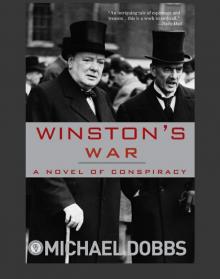 Winston's War
Winston's War The House of Cards Complete Trilogy
The House of Cards Complete Trilogy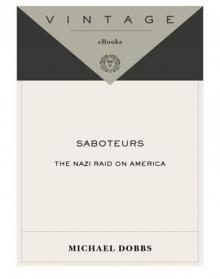 Saboteurs
Saboteurs The Touch of Innocents
The Touch of Innocents WC02 - Never Surrender
WC02 - Never Surrender Old Enemies
Old Enemies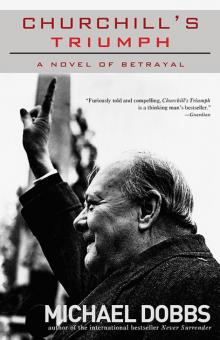 Churchill's Triumph
Churchill's Triumph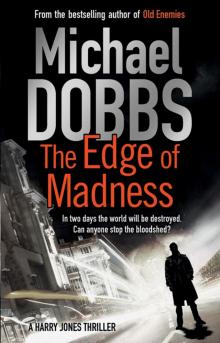 The Edge of Madness
The Edge of Madness Goodfellowe MP
Goodfellowe MP The Final Cut
The Final Cut Whispers of Betrayal
Whispers of Betrayal Churchill's Hour
Churchill's Hour The Buddha of Brewer Street
The Buddha of Brewer Street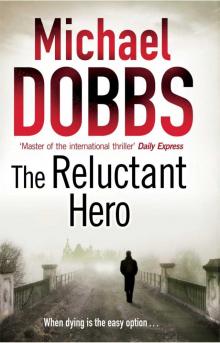 The Reluctant Hero
The Reluctant Hero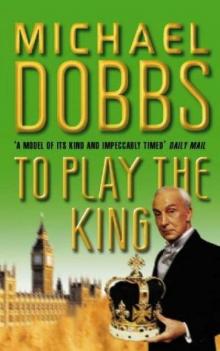 To Play the King
To Play the King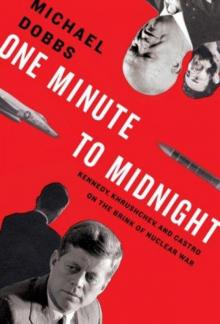 One minute to midnight
One minute to midnight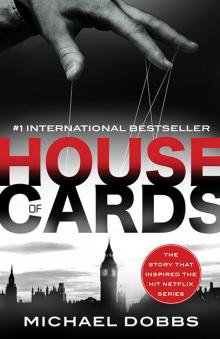 House of Cards
House of Cards The Lords' Day (retail)
The Lords' Day (retail)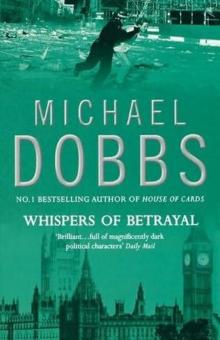 Whispers of betrayal tg-3
Whispers of betrayal tg-3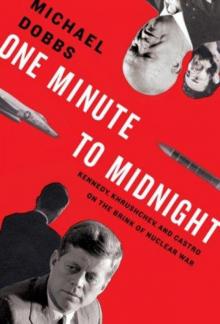 One minute to midnight: Kennedy, Khrushchev, and Castro on the brink of nuclear war
One minute to midnight: Kennedy, Khrushchev, and Castro on the brink of nuclear war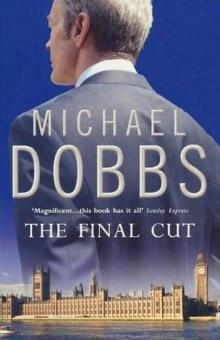 The Final Cut fu-3
The Final Cut fu-3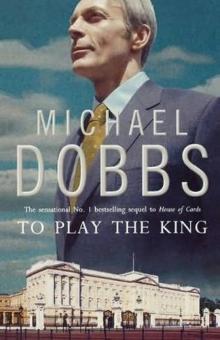 To play the king fu-2
To play the king fu-2 A Ghost at the Door
A Ghost at the Door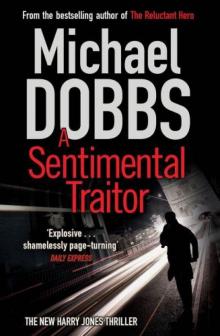 A Sentimental Traitor
A Sentimental Traitor